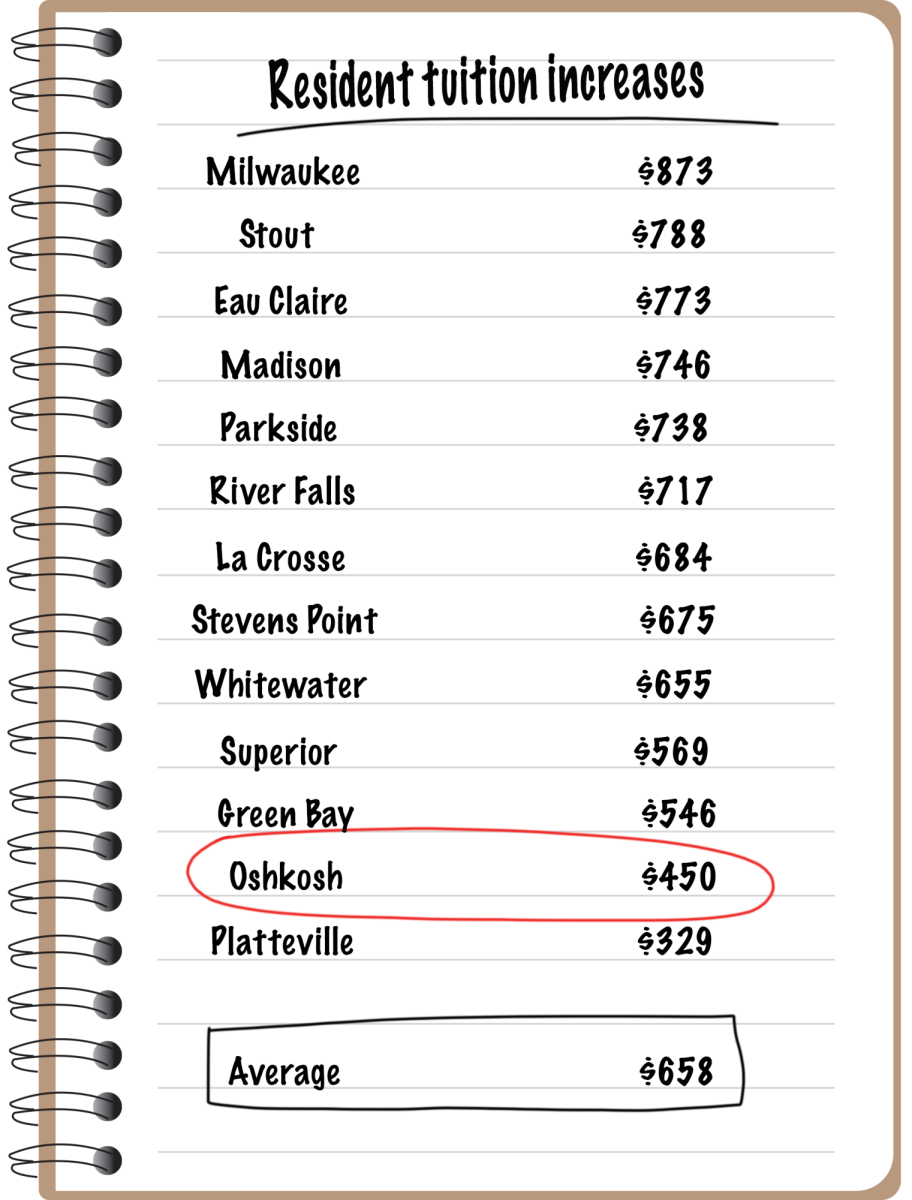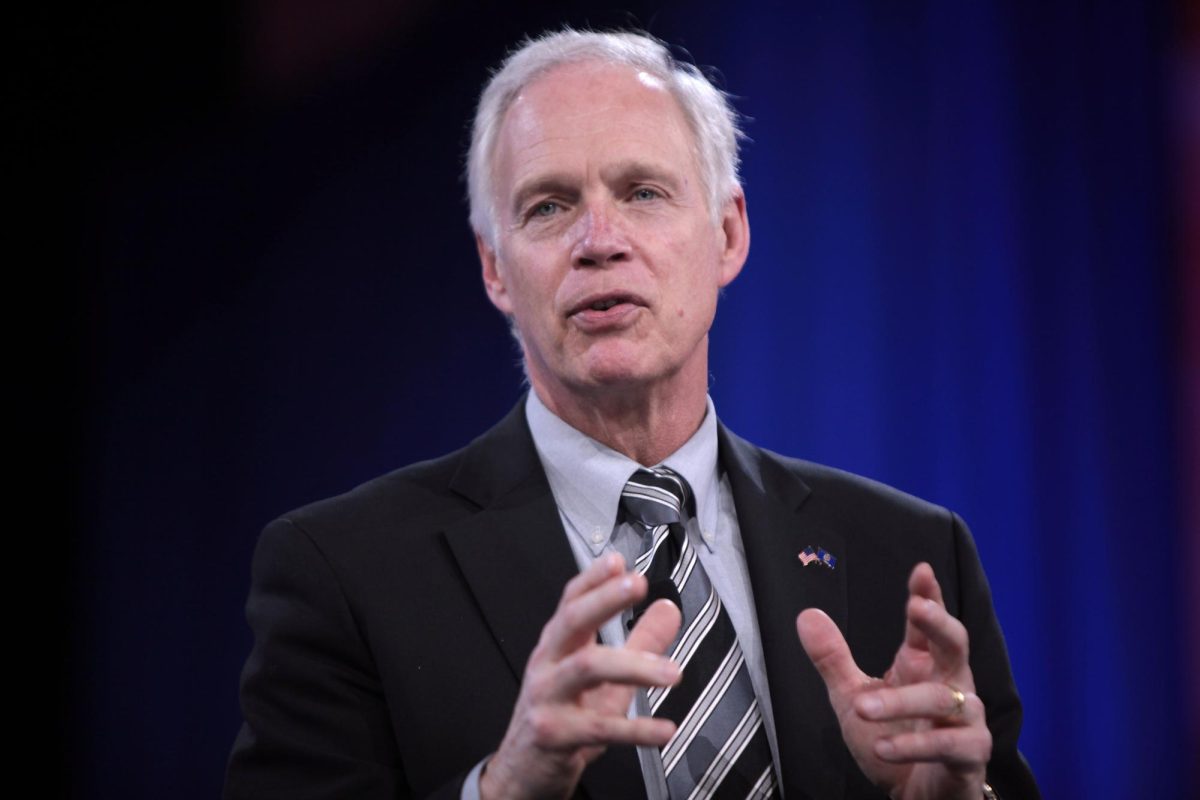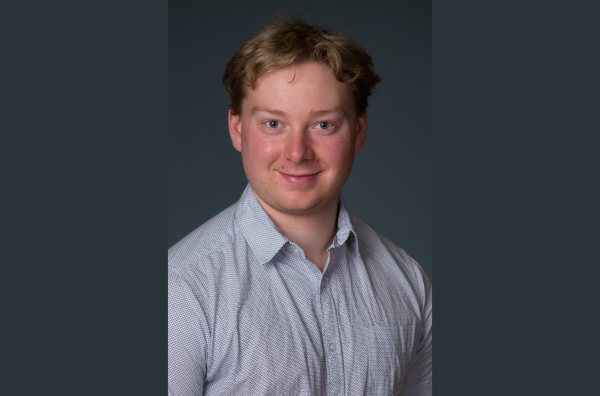Universities of Wisconsin President Jay Rothman and the Board of Regents announced April 4 that all UW campuses will be raising their resident tuition by an average of 3.75% for the 2024-2025 academic year.
Rothman said he asked the Board of Regents to approve a tuition increase to maintain the level of education the Universities of Wisconsin provides.
“Our universities are facing challenging economic realities, and students and parents should know that we plan to be good financial stewards,” Rothman said. “Maintaining our affordability advantage, especially compared to our peers, is a priority because we want more students to get access to the unlimited opportunities our universities provide.”
On average, Universities of Wisconsin undergraduates will have to pay $7,673 per year in tuition starting in the Fall 2024 semester, a $318 increase from the 2023-24 school year.
Aside from tuition, which was increased by the Board of Regents for the second straight year after 10 years of a tuition freeze, UW undergrads will have to pay an additional $74 in segregated fees.
The cost of attendance for resident undergrads will increase about 4.4% across the UW when room and board and segregated fees are considered alongside tuition.
According to the Milwaukee Journal Sentinel, Rothman said that the tuition increase would generate $39 million annually to “keep pace with rising costs.”
Rothman defended the decision to raise tuition across the UW and said that the UW schools provide an education that opens doors and helps students discover their potential.
“We know that investing in a degree from one of our 13 universities pays off – not only in career earnings but also in opportunities,” Rothman said. “Our students are being educated to fill jobs that do not yet exist, which is critical in a world that is changing drastically due to technological advancements.”
UW Oshkosh students will see their tuition increased by $255, a 3.75% increase from the 2023-24 tuition costs.
UWO Chancellor Andrew Leavitt said that he doesn’t have much of a role in the process of increasing the cost of attendance.
“It’s a process that’s carried out at the Universities of Wisconsin level,” Leavitt said. “They will make a proposal to the Board of Regents and chancellors have input into it. For instance, they’ll say, what do you think about this? Is it too high, too low, and we give an opinion. But that’s the extent of our role in this.”
Leavitt said that he thought the 3.75% increase in tuition was reasonable.
“You have to remember: we’re coming off of 10 years of not having any increase in tuition,” Leavitt said. “At the same time, we have tremendous inflationary pressures that we’re working through, which is partly the reason why we had to go through some rather difficult budgetary issues this last fall.”
After the tuition hike, full-time undergraduate resident students at UWO will have to pay $7,060.79 per school year starting in the fall, while non-resident undergrads will need to pay $14,974.54. Graduate students will need to pay $8,580.40 if they are a Wisconsin resident while non-resident graduate students now have to pay $18,463.86 per year in tuition costs.
UWO students who attend Fond du Lac and Fox Cities branch campuses will have to pay $5,150.32 next school year if they are a resident and $13,641.04 if they are a non-resident.
The cost of attendance at UWO, not just tuition, is also increasing for the next school year. UWO students will have to pay an extra $65 in segregated fees for a 3.9% total increase. While room and board at UWO dropped $49 ($5,309 for one year), meal plans increased $179 and the overall cost of attendance rose $450. After the changes, the average on-campus UWO student must pay $17,601 to attend the university for 2024-25, a 2.6% increase from this school year.
Leavitt said that in the Midwest, Wisconsin continues to be a relatively low tuition state compared to neighboring states.
“If you notice our room charge actually went down $49,” Leavitt said. “When we renovate residence halls or have any kind of maintenance, large scale maintenance issues or residence halls, typically you have to borrow money to do that. We ended one of the debt service obligations, so we’re able to pass the savings on to the students.”
According to Leavitt, the Student Allocations Committee, which works independently of the Oshkosh Student Government, determines the amount of segregated fees that students pay through their tuition.
“Those recommendations are forwarded to me by the SAC committee,” Leavitt said. “So that’s where they have their role; any changes in segregated fees comes from the students.”
UWO political science student Sawyer Moens said the increase in cost of attendance is really going to hurt him.
“Because of having to take out student loans, it’s only going to put me in more debt,” Moens said. “I am planning on going to law school and knowing I’m going to have a big bill there really scares me. So having to worry about increases at the undergrad level is really unfortunate.”
UWO kinesiology student Sam Peterson said he wants to know why the university raised tuition if administrators let staff go to help with the budget deficit.
“What does the extra $450 actually do for me?” Peterson said. “What’s the point of lowering room and board if we are just going to raise tuition, especially with the classes that are getting cut, and there is basically no more Testing Center.”
Leavitt said that he realizes that any increase can create a barrier for students.
“At the same time, we need to preserve quality, we need to preserve the experience for the students,” Leavitt said. “So, I thought this very modest increase was sufficient to do that.”
Moens said that he thinks the biggest problem at UWO is the lack of people graduating and the current enrollment.
“Increasing tuition is not going to help that,” Moens said. “I think that if they want heads in beds, the price has to stay the same.”
Leavitt said that the tuition increase is not related to the budget deficit the university is facing.
“Enrollment is going to be what impacts any future deficit we might have because we have plans to have closed our deficit by the end of next year,” Leavitt said. “With the $18 million deficit we have, we’ve already closed it down to $3 million. So certainly, a tuition increase to me is a way to help us maintain quality in real time.”
Leavitt said that he doesn’t think there would ever be a decrease in the tuition of an institution.
“I don’t know of any other commodity I can think of, you know, other than something as volatile as a fuel that goes up or down,” Leavitt said. “I mean, think of rent and other kinds of things like that.”
Leavitt said he thinks the university has done very well to help manage the cost of attendance for UWO students.
“We understand that any kind of increase presents a barrier to students that we want to preserve quality and at the same time, we certainly encourage students to fill out the FAFSA, which is very important to make sure they have the full access to student aid.”
Moens said he thinks that blaming everything on Leavitt is unfair, and that other administrators should take the blame for the tuition increase and should be doing more for students.
“Find donors. Find ways to make revenue without taking it out on the students,” Moens said. “The actions of administration should not reap consequences on the students of this university.”










